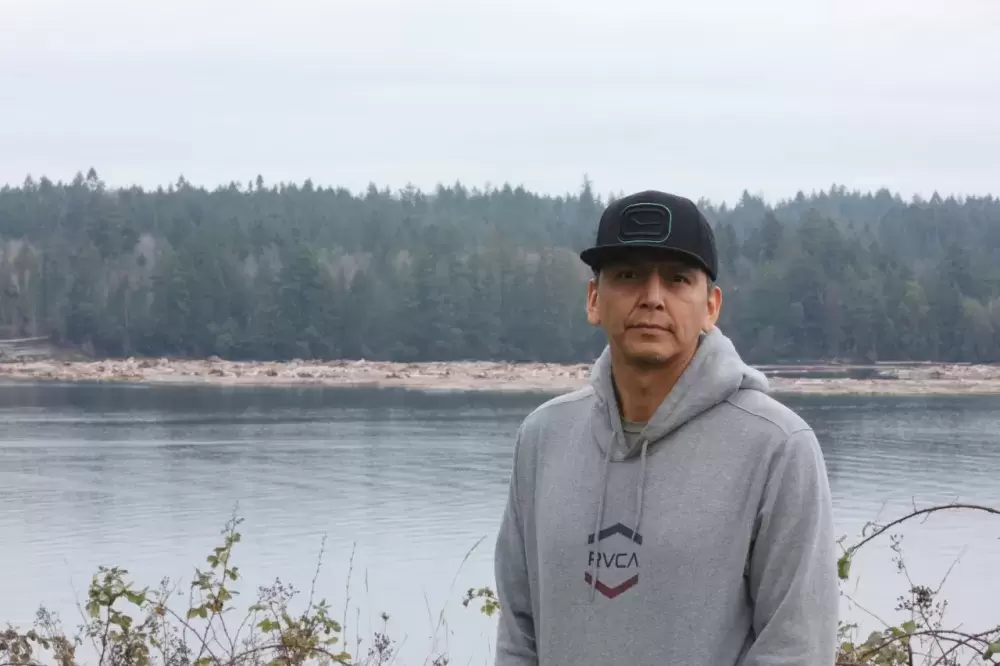A small Vancouver Island First Nation has become collateral damage in a prolonged forestry strike, as salvaged logs from Nuchatlaht territory have been stranded in Western Forest Products’ Ladysmith harbour for over seven months.
On Monday Feb. 10 Tyee Ha’wilth Jordan Michael looked across the water at the Burleith Arm log sort in Ladysmith. He recognizes some of the Western red cedar he collected from his tribe’s territory on the north side of Nootka Island last year, but the hereditary chief and his 163-member nation have been unable to collect it since unionized Western Forest Products employees went on strike July 1, 2019.
“What bothers me the most is that we’re out on our own in our own territory doing our own thing,” said Michael. “There’s no way to get it to market without getting screwed over.”
For the last four years the Nuchatlaht First Nation has collected timber from its territory on Nootka Island, off the west coast of Vancouver Island. The logs have fallen by wind or through natural causes – or were left on the cutblock from other forestry companies. In early summer 2019 the Nuchatlaht contracted Western Forest Products to transport 3,058 square metres of this wood by barge for sale. The red cedar is normally sold to specialty markets for furniture, to carve canoes, said Michael.
“There’s a lot of high-grade cedar there that goes to specialty markets,” he explained. “We have other nations that want to buy canoe logs and totem logs too.”
Along with 13,000 cubic metres of other wood that Western was transporting, the barge had made its way around the southern edge of Vancouver Island, and was headed to the Lower Mainland when the United Steelworkers Local 1-1937 went on strike July 1, 2019. WFP operations halted, including the barge, which dumped the timber at the Ladysmith harbour, mixing the Nuchatlaht wood in with everything else.
Issues of contention between WFP and the union include contracting out labour to non-union outfits, dangerous alternative shifts, safe workplaces and more secure jobs, making a dispute that has become the longest coastal forestry strike in British Columbia’s history, affecting 3,000 Western employees on the Vancouver Island and countless more contractors.
On the day that Michael looked across the water at his cedar in Ladysmith, the USW and Western announced a possible end to the seven-month-long stoppage with a tentative agreement that remains subject to a ratification vote by union members. USW is recommending that the agreement gets passed.
“Our union is extremely proud of our members' solidarity in this extended struggle to achieve a fair collective agreement with Western Forest Products and their associated contractors,” said Brian Butler, president of USW Local 1-1937. “I am pleased to report that the tentative agreement does not contain any concessions, which was a key mandate from our members.”
This news brings little relief to Michael, who valued the timber at $1 million when it was removed from Nootka Island. Over each day that it sits in the salt water by Ladysmith the cedar loses value, as the ocean on the east side of Vancouver Island is affected by Teredo navalis, a naval shipworm that bores through wood. Now Michael is anticipating what was expected to be a good profit will become a financial loss for his nation.
“There’s a lot of stuff going on in our community that could really use this money,” he said. “We use stuff like this to subsidize our income. When it gets locked up like this it really hurts.”
Making the dilemma more frustrating is the lack of action from the disputing parties to release the Nuchatlaht wood over the course of the strike. After multiple inquiries and unanswered phone calls to the union, Michael met with its president.
“He pretty much told me that people are going to get hurt, people are going to suffer, there’s going to be lots of loss and there was nothing they could do for me,” said Michael.
The Nuchatlaht also looked into hiring a contractor to remove the timber, but the high visibility of a procedure done behind the picket lines was discouraged. In September the First Nation took the issue to the Labour Relations Board, only to have the application dismissed.
Now with an end to the strike within sight, the barging could finally be finished - more than seven months late.
“With a tentative agreement in place, we will be working to resume operations expediently once USW members vote on ratification,” said Western Forest Products’ communications in an email to Ha-Shilth-Sa.
“We did everything right on our end,” said Michael of the salvage operation that should have been a success for his nation. “We had to fight for every inch that we got. Now that we’re in a place to finally succeed, it’s hard to get out from being under somebody’s thumb.”







